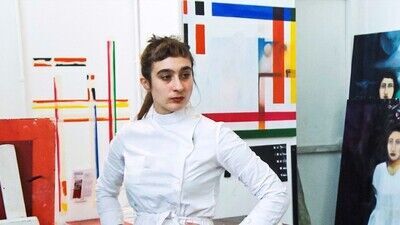In that regard, Glob’s film is far from a cliched fly-on-the-wall cinematic portraiture, and the type of documentary that usually grabs the attention of the Oscars. (This one fortunately and miraculously did, as the movie is now a part of the Academy’s coveted shortlist of a handful of documentaries competing for the top prize in the non-fiction category.) It is instead an experimental work in which the subject and the filmmaker are pronouncedly enmeshed, one as edgy as its chief subject Apolonia, a tireless creator of angular features, typified by a resolute demeanor and bangs that she trims herself like a sculptor of her own image.
In the beginning, Apolonia seems to have all the good fortune and promise a painter could desire. Born into an artistic community in an underground theater in Paris, she studies at the prestigious art academy Beaux-Arts de Paris and leads an enviable bohemian life in one of the most beautiful cities of the world at the very theater she was raised in, now a communal hostel of sorts where Apolonia hosts up-and-comers like herself.
But as Glob returns to Apolonia time and time again, she observes that those assets that once made her a thriving and inspired artist are seemingly slipping right through her hands as Apolonia seeks and fights for a fulfilling and productive life on her own terms. As we watch the ups and downs of her life and restless artistic process, we do take note that many things that are hard for her to attain and maintain would likely come easy to her male counterparts, even if they aren’t as talented. In one scene, we watch Apolonia complain about her male professors in anger. When one of them insults Apolonia’s paintings by insinuating that they aren’t as interesting as she is, through voice over, Glob wonders if they would’ve said the same to a male painter. You can’t help but agree with both the director and subject’s irritation.
Still, Apolonia sticks with her chosen path, even when she loses her theater community and finds herself stuffed in a tiny apartment with her mom and her friend Oksana, a Ukrainian artist and unapologetically feminist activist seeking asylum. The beautiful relationship between the two women who pledge against marriage and children and all-things they deem patriarchal gradually becomes the film’s most heart-swelling (and at times, heartbreaking) core as the duo deal with their fair share of problems, with Oksana also struggling with her vulnerable mental health.

